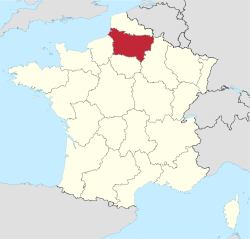Picardie
|
Picardy Picardie |
||
|---|---|---|
| Region of France | ||
|
||
 |
||
| Country |
|
|
| Prefecture | Amiens | |
| Departments | ||
| Government | ||
| • President | Claude Gewerc (PS) | |
| Area | ||
| • Total | 19,399 km2 (7,490 sq mi) | |
| Population (2007-01-01) | ||
| • Total | 1,890,000 | |
| • Density | 97/km2 (250/sq mi) | |
| Demonym(s) | Picards | |
| Time zone | CET (UTC+1) | |
| • Summer (DST) | CEST (UTC+2) | |
| ISO 3166 code | FR-S | |
| GDP (2012) | Ranked 14th | |
| Total | €49.7 billion (US$64 bn) | |
| Per capita | €27,611 (US$35,556) | |
| NUTS Region | FR2 | |
| Website | cr-picardie.fr | |
Picardy (/ˈpɪkədɪ/; French: Picardie, French pronunciation: [pi.kaʁ.di]) is a historical territory and a former administrative region of France. Since 1 January 2016, it is now part of the new region of Hauts-de-France. It is located in the northern part of France.
The historical province of Picardy stretched from north of Noyon to Calais, via the whole of the Somme department and the north of the Aisne department. The province of Artois (Arras area) separated Picardy from French Flanders.
From the 5th century the area was part of the Frankish Empire, and in the feudal period it encompassed the six countships of Boulogne, Montreuil, Ponthieu, Amiénois, Vermandois, and Laonnois. According to the 843 Treaty of Verdun the region became part of West Francia, the later Kingdom of France.
The name "Picardy" (which may have referred to a Frankish tribe of picards or pike-bearers) was not used until the 12th or 13th century. During this time, the name applied to all lands where the Picard language was spoken, which included all the territories from Paris to the Netherlands. In the Latin Quarter of Paris, people identified a "Picard Nation" (Nation Picarde) of students at Sorbonne University, most of whom actually came from Flanders. During the Hundred Years' War, Picardy was the centre of the Jacquerie peasant revolt in 1358.
...
Wikipedia

